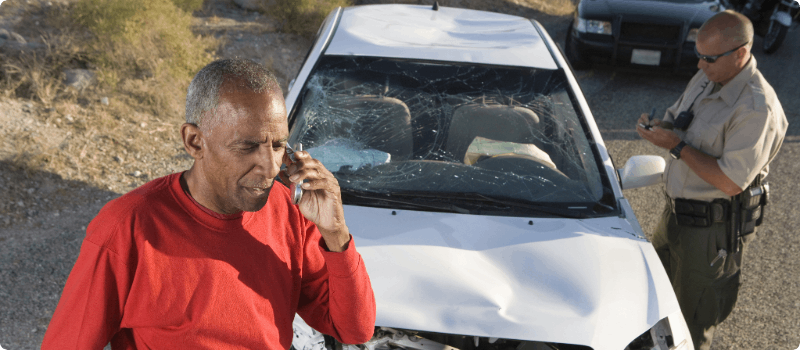The Car Insurance Claims Process: A Guide to Filing a Car Crash Claim
Updated July 5, 2024 . AmFam Team
Filing an auto insurance claim is usually necessary after getting in a car accident. Fortunately, it doesn’t have to be difficult. We’ve collected some key information on what to do after an auto accident into this article. It should help you get through the car insurance claims process with confidence.
What to Do Right After an Accident
After an accident, do the following:
- Don’t leave the scene but move your vehicle to a safe location if possible.
- Turn off your engine and get out of the vehicle if you can.
- Call 911 to report the accident, then check if anyone is hurt and in need of medical attention.
As you take care of things in the present, try to keep the future in mind, too. Prepare for the car insurance claims process by doing the following:
- Don’t accept blame or place it on the other driver. You’ll figure all that out later with your insurance company.
- Exchange names, insurance information and contact details with the other involved driver(s).
- Take photos of the scene. We recommend capturing:
- Any damages done to their vehicle(s) and yours
- The direction each vehicle was traveling
- The license plates of all vehicles involved
- The other driver(s) involved
- Traffic signs from around the accident scene
- Take notes on your phone or a notepad as well. Capture as many details as you can, especially:
- Date, time and exact location of the accident
- Driver and passenger names and ages
- Police officer names, badge numbers and time of arrival
- Road conditions
- The speed you were driving
- Weather conditions
- Names and contact information of witnesses
- Year, make, model and color of the other car
For even more information, you can check out our “what to do after a car accident” checklist.

Do I need to call the police after a car accident?
Whether anyone is injured or not, call the police and report the accident immediately. Insurance investigators will use the resulting police report when assessing your claim.
Gather the Following from Emergency Services
- Names and badge numbers of on-scene police officers
- The phone number for accessing the police report
- Police report number
- Time of police arrival
Whose insurance do I call after an accident?
Whether you or another driver is at fault, you need to inform your insurance provider. They can assess the situation, as well as your claim. They’ll also talk with the other driver’s provider to determine who will pay what.
Insurance compensation for car accidents can vary depending on where you live. In states with a fault-based system, injured parties may file claims against the at-fault driver’s insurance. Their provider may cover the damages up to policy limits. If both parties are at fault, whether to equal or different degrees, then both their insurance companies may need to pay out.
Some states are considered no-fault states. If there is an accident, it doesn’t matter who’s at fault. It’ll be your insurance that covers you up to a specified limit for personal injury, car damage and related claims, such as lost wages. Likewise, the other driver will be responsible for their own damages and injuries.
You should be aware of whether you live in an at-fault state or a no-fault state. Check your policy for the specifics to better understand how you’re covered.
What if the other driver doesn't have any or enough insurance?
If the other driver is at fault and has no insurance, you must file a claim with your insurance company under your uninsured motorist coverage. Having this, even if the at-fault driver can’t.
If you don’t have uninsured motorist coverage, there’s another option available. You could press charges and take them to small claims court. After all, driving without insurance is illegal in almost every state. However, that process could cost you even more time and money. Having that coverage could save you that trouble.
Sometimes, the other driver does have insurance, but medical costs greatly exceed their policy’s limits. Underinsured motorist coverage may cover what the at-fault party couldn’t.
What if I don't have insurance?
If you don’t have car insurance in a state that requires it, these may be among the consequences after an accident:
- If you’re at fault, not only will you be paying out of pocket for any medical expenses or damages to your vehicle, but you’ll be responsible for paying for the other driver’s injuries and damages as well.
- The other party could sue you for damage and injuries you caused them.
- You could receive a ticket, face jail time and potentially lose your license and registration.
- You may have trouble finding affordable car insurance rates if you eventually do shop for a policy.
Car insurance is a requirement for drivers almost anywhere you go. Make sure to know the minimum required policy limits in your state and get insurance that matches or exceeds them.

What do I need to file a car accident claim?
According to DMV.org, you’ll need to submit the following information to your car insurance company when filing a claim:
- Date, time and location of the accident
- Detailed description of how the accident occurred
- Insurance and contact info of the other party involved
- Insurance policy number, which can be found on your insurance card
- Name of the police department involved
- Police report number
How does coverage apply to vehicle repairs and medical expenses?
Until fault is determined, your insurance company cover the cost for repairs and injuries. That’s if you have the appropriate coverages, like collision or medical expense coverage. Make sure you keep the following in mind when getting repairs:
- You may have to take your car to one of your car insurance company’s approved body shops for repairs. Check with your agent to find out where you can commit your car and get reimbursement. Note: you can get an estimate at any body shop.
- The person in charge of investigating your claim, known as your adjustor, may have you compare different quotes at several shops of your choice.
- If you choose your own repair shop, you might have to pay the difference between the shop’s estimate and what your insurer decides is a fair price.
Does your claim include medical expenses from injuries that you or your passengers sustained in the accident? If so, then keep the medical receipts. Your claims adjustor will need copies of them for evidence and reimbursement.

How do I file an insurance claim after an accident?
Your insurance company can walk you through the process of filing a car crash claim. They’ll also tell you exactly what information they’ll need.
Once your claim is filed, a claims representative will contact you. They’ll review your claim and work with you to accurately evaluate it. Finally, they’ll assess your claim and try to complete it as quickly as possible.
As an American Family Insurance customer, you have a few options for starting the process. You can file a claim from your MyAmFam app or online at amfam.com. Calling 1-800-MYFAM (1-800-692-6326) can put you directly in touch with a claims representative. Lastly, you can contact your agent, who can help you get started.
What if I want to make a claim but don’t have a police report?
You can still file a claim without a police report. Gather as many of the following details as possible before calling your insurer:
- Photographs of the accident scene and damage to the vehicle
- Statements of the parties involved
- Transcribed eyewitness statements
- The weather and road conditions at the location of the accident
How long do I have to file a claim?
You’ll want to start the claims process as soon as possible, so filing a claim should be done promptly. The statute of limitations may allow a few years or just one, depending on the state. However, some insurance companies may only pay the costs of repairs for the year in which the accident occurred.
Putting it off isn’t in your best interest. The longer you wait, the harder it may be to track down other people involved in the accident for interviews or other potentially helpful research related to the claim.
Our advice? File the car crash claim right away. At the very least, contact your insurance agent as soon as you can after the accident.

How does a car insurance claim work after an accident?
Your company will assign a claims adjustor to investigate your case. The process may involve the following:
- Reviewing the police report
- Interviewing you for your side of the story
- Interviewing other parties involved and witnesses at the scene
- Inspecting photos you send us of your car for damages
- Asking you to sign a medical release form so they can look at your records
- Contacting any medical providers to gather information regarding your injury expenses
- Reviewing medical records, bills and proof of wage loss
- In some cases, looking into your social media accounts to corroborate any of the details you provided
The adjustor will also work with the other party’s insurance company to determine what you may receive for your claim.
Can I get insurance after an accident?
Auto insurance only pays for accidents that occur after coverage becomes active.
Do I need to file an insurance claim after a minor accident or a fender bender?
American Family's auto insurance policies require customers to notify us about any incidents involving their vehicles. This ensures that we can properly assess exactly how much damage any incident causes to a car. It also protects people in case the other driver's carrier disputes loss details or falls short in coverage. We may offer assistance you may not even realize you need.
If you were at-fault in a minor accident or fender-bender, you should reach out right away. Your provider can take you through the car insurance claims process and help you get things back to normal.
How do I know if I’m covered after an accident?
Confirm your policy details with your American Family Insurance agent. Understanding your car coverages can give you peace of mind when you hit the road.
This article is for informational purposes only and based on information that is widely available. This information does not, and is not intended to, constitute legal or financial advice. You should contact a professional for advice specific to your situation.
Tools & Resources
NextScripts
JSS component is missing React implementation. See the developer console for more information.

